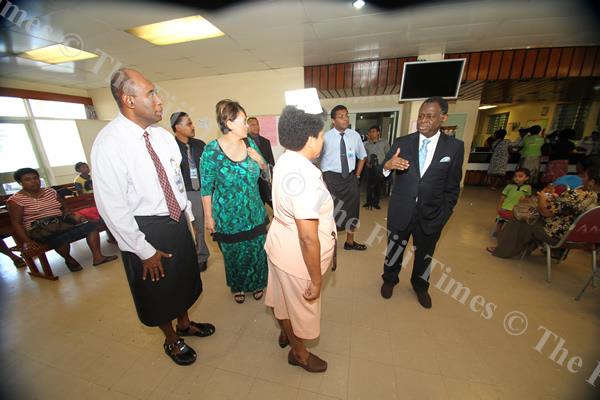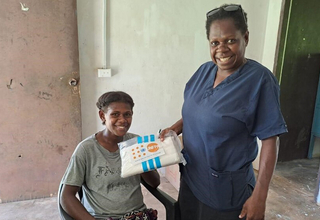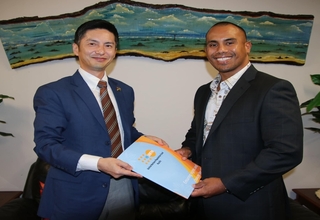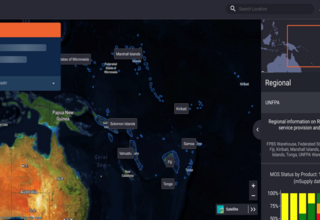WHAT major event do you remember from 1994 - your first job or child perhaps? For the United Nations Population Fund (UNFPA), it is a defining year on our timeline because 179 governments signed the Program of Action (POA), a 20-year program, during the International Conference on Population and Development (ICPD) held in Cairo.
2014 and beyond

The POA outlined frameworks within which countries were to develop their own national strategies for population and development growth, based on their country-specific realities; essentially the main objective of the agreement reached was to raise the quality of life and wellbeing of human beings and to promote human development.
That conference also marked a fundamental shift, from looking at population issues strictly from a statistical perspective to a human rights-based approach for example, that individuals and couples have the right to decide freely and responsibly the number, spacing and timing of their children. The UNFPA works towards the achievement of this right; critical is the provision of correct sexual and reproductive health information, and the means to realise and live their choices.
The POA recommended a set of interdependent quantitative goals and objectives like the universal access to primary education, universal access to primary health care, reduction of infant, child and maternal morbidity and mortality and the promotion of sexual and reproductive health. To realise these goals, the UNFPA works in partnership with governments and other stakeholders. Addressing country-specific challenges like harsh geographic realities, certain traditional practices and personal attitudes are also critical for an enabling environment.
The Pacific has a dynamic population historically, from navigators that peopled this ocean of islands to today's movements for education or employment, as our people respond to limited resources and relative isolation. Add to this the potential impact of climate change and an ageing population, and we can expect a region that will be a lot more dynamic, if not fluid, in the coming years.
In 1999, amendments were made to the UNFPA program to incorporate the goals of the Millennium Declaration. The ICPD POA is divided into five-year program cycles; the UNFPA is now at a critical juncture, as far as our support for the 14 regional governments we work with is concerned.
One of the main questions for the UNFPA at the end of this 20-year program was whether it continued its programs or not. In December 2010, the United Nations General Assembly agreed the UNFPA should continue its ICPD POA beyond 2014. This year, there will be a special session of the General Assembly so countries can have an assessment of the implementation of the POA, and hopefully there will be renewed political support for continued efforts towards the realisation of the ICPD POA 1994 goals.
In this context, a review of the implementation of the POA has been conducted globally; governments that we work filled out questionnaires. For the Pacific region, a report encapsulating the findings was yesterday launched by the UNFPA executive director, Dr Babatunde Osotimehin.
The report, Pacific Regional ICPD Review: Review of the Implementation of the International Conference on Population and Development Programme of Action Beyond 2014", provides key findings and recommendations relevant to the post-2015 development agenda.
Dr Babatunde, a physician and public health expert, is the fourth executive director of UNFPA. Before taking the helm of the UNFPA, Dr Babatunde was Nigeria's health minister after leading its National Agency for the Control of AIDs, co-ordinating HIV and AIDs-related work.
Dr Babatunde, who is known for his commitment to young people and their access to sexual and reproductive health services, met a group of young people in Suva before launching the report. He is a great believer in young people's potential contribution towards finding solutions to global challenges. Young people, Dr Babatunde believes, should be afforded the space and opportunities to develop, and they must have access to proper health services, quality education and empowerment.
In preparation for implementing the ICPD POA beyond 2014, the UNFPA, under Dr Babatunde's leadership, has restructured its administrative functions and strengthened its external relations. Dr Babatunde's recognition of the media's vital role in development has seen him at the forefront of the organisation's efforts to communicate the UNFPA mandate and programs; he has a series of interviews on the major television networks, and his opinion-editorials have often featured in renowned press outlets.
The Pacific report Dr Babatunde launched yesterday hopes to provide readers with an insight into the diverse home-grown approaches Pacific countries used to implement the POA. It is hoped as well the reader will appreciate the remaining challenges, and opportunities that exist for further improvement.
The report affirms the continuing vulnerability of the Pacific people for despite its relative isolation from the major industrial-driven economies, the rippling effect of the latter's activities are felt here.
The findings highlight both the successes and the formidable challenges our island nations continue to grapple with like the increasing population growth rates in some countries, which threatens a viable future or the slow economic development growth that does not correspond to the population growth rate, which has implications on food security, for instance. Despite these continuing challenges, there have been notable signs of progress: the number of countries with national population policies is steadily increasing; sexual and reproductive health programs have received considerable attention and the integration of sexual and reproductive health into primary health programs has also improved.
There are recurring themes from the report recommendations which include: the critical need for frameworks (laws or policies) to ensure an enabling environment in which development goals can be realised and flourish; the need for research so national planning and contribution from organisations like the UNFPA are evidence-based; the provision of alternatives for rural-based people to curb migration that can suffocate our urban centres and fuel the vicious cycle of poverty; and partnerships is also emphasised for the much-needed integrated approach our development agenda needs. The UNFPA will also accelerate its efforts in sexual and reproductive programming.
We have in our hands a report which can inform our next moves in development; it is up to us how we can best use it. The question is: what legacy would we want to leave behind?
- This is part of a series of columns provided for publication to Fiji's largest national daily newspaper, The Fiji Times, fortnightly.




